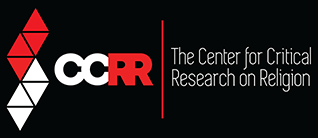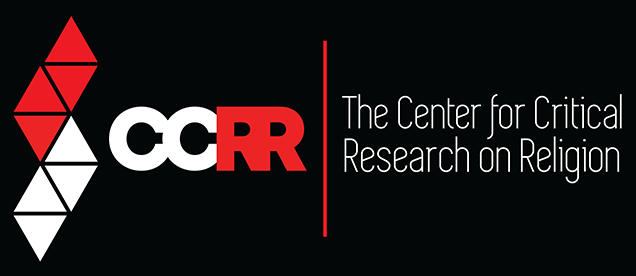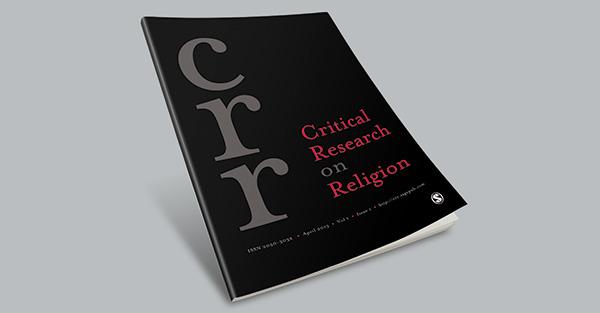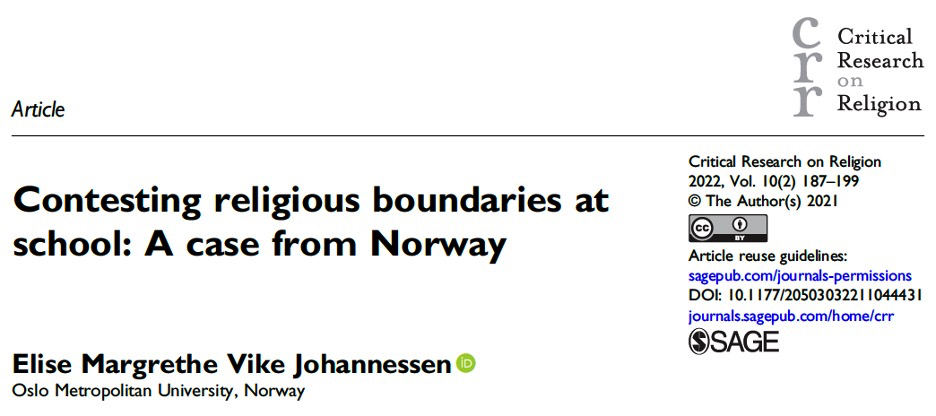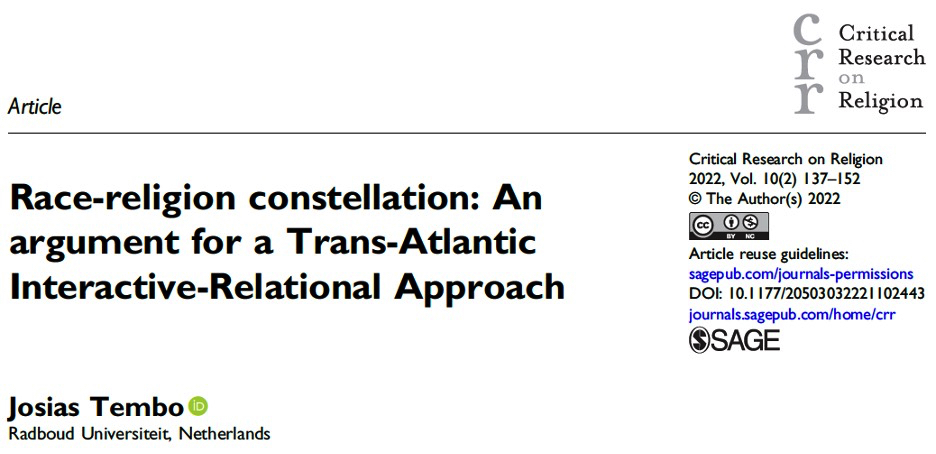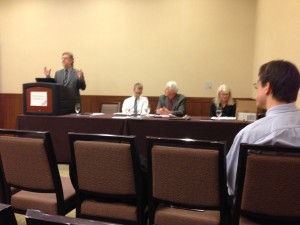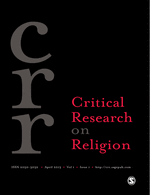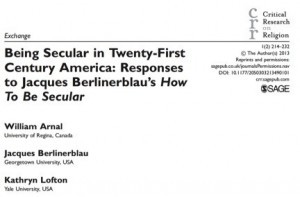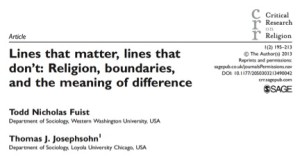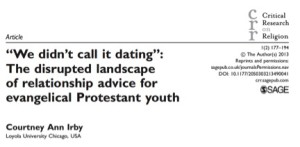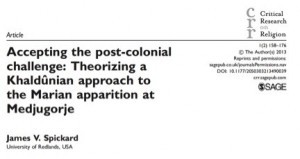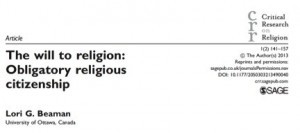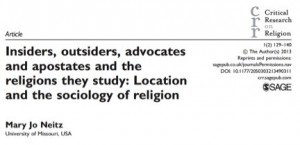Rabea M Khan, “Speaking ‘religion’ through a gender code: The discursive power and gendered-racial implications of the religious label”
Josias Tembo, “Race-religion constellation: An argument for a Trans-Atlantic Interactive-Relational Approach”
“Prospects for a Critical Sociology of Religion” – Critical Research on Religion at RRA / SSSR joint meeting, 9th November 2013
Critical Research on Religion (CRR) is committed to the development of critical theoretical frames in the disciplines and subdisciplines that study religion. One subdiscipline where critical approaches have been underdeveloped is in the sociology of religion. To address this, CRR commissioned a special issue on developing a critical sociology of religion. Authors of this special issue discussed their articles at a session entitled “Prospects for a Critical Sociology of Religion.” It was held at the joint meetings of the Religious Research Association (RRA) and Society for the Scientific Study of Religion (SSSR) at the Westin Waterfront Hotel in Boston on Saturday November 9th, 2013.
Rhys Williams (Loyola University of Chicago), who guest edited the special issue, organized the panel and served as its moderator. He began the session with the history of the Society for the Scientific Study of Religion (SSSR). He was president of this association as well as editor of their journal, The Journal for the Scientific Study of Religion (JSSR). While faculty from Yale, Harvard, and Columbia Divinity Schools founded the SSSR, unlike the other North American sociology of religion associations – the Association for the Sociology of Religion (ASR) and the Religious Research Association (RRA) – SSSR was non-confessional. All of these associations have become secularized over time. However, SSSR’s original purpose to promote the social scientific study of religion was implicitly critical and Williams pointed out that Critical Research on Religion was founded in much the same spirit.
Todd Fuist (Western Washington University) discussed the article that he wrote together with Thomas Josephsohn (Loyola University of Chicago) entitled “Lines that matter, lines that don’t: Religion, boundaries, and the meaning of difference.” The article is based on separate sets of interviews conducted by both Fuist and Josephsohn. Central to their argument is the significance that religious differences play in the interactions between individuals and their perceptions of each other. Based on these interviews, Fuist and Josephsohn analyze the religious boundaries between individuals using a matrix, which categorizes whether the boundaries are permeable or impermeable or whether the religious differences are relevant or irrelevant.
Jim Spickard (University of Redlands) talked about his article “Accepting the post-colonial challenge: Theorizing a Khaldûnian approach to the Marian apparition at Medjugorje.” In his presentation, Spickard discussed the sociological ideas of Ibn Khaldûn, a 14th century Islamic thinker. A major idea of Khaldûn is al ‘assabiyyah or group feeling, which is a centripetal form social solidarity. While group feeling enables cohesion, it also causes division. Spickard used this non-Western frame to analyze the Catholic Marian apparition site at Medjgorje in Herzegovina. He explained the role it played in exacerbating the conflict between the Muslim Bosnians and Catholic Croatians during the Bosnian War in the 1990s.
Lori Beaman (University of Ottawa) discussed her article “The will to religion: Obligatory religious citizenship.” She argues that there is a “new normal” which assumes that all people are religious. It is presupposed that we all have religious needs and those claiming to have no religion are in denial. Particularly in survey research, there is a push to categorize all believers- even those who are atheists. However, with the increasing percentage of “nones”- those who do not have any religious affiliations or beliefs – there is a middle category, which defies categorization.
Finally, Michael Puett (Harvard University) served as a discussant. He artfully tied together all the papers of the session. In particular, he pointed out that our understanding of religion is shaped by Western thinkers. While this has enabled our knowledge about religion to progress, at the same time, it limits us. In order to transcend the current boundaries of our knowledge, it is necessary for us to make use of non-western thought in understanding both western and non-western religion.
As a new journal, Critical Research on Religion is critical in its reliance not only on the social sciences but on the humanities as well. It is committed to transcending boundaries- the boundaries of religious differences, the boundaries between the Occident and the non-Western world, the boundaries that are created in assuming that religion is the new normal- in short, the boundaries of our understanding about religion. The discussion of the articles in the special issue at SSSR / RRA helped to bring this to light.
Warren S. Goldstein, co-editor, Critical Research on Religion
Berlinerblau, Lofton, and Arnal, “How To Be Secular”
Todd Fuist and Thomas Josephsohn, “Lines that Matter, Lines that Don’t”
Courtney Ann Irby, “We didn’t call it dating”
James V. Spickard, “Accepting the Post-Colonial Challenge”
Lori Beaman, “The Will to Religion: Obligatory Religious Citizenship”
Mary Jo Neitz, “Insiders, Outsiders, Advocates and Apostates and the Religions they Study”
Categories
- Critical Research on Religion
- CRR Editorials
- CRR Volume 1, Issue 1
- CRR Volume 1, Issue 2
- CRR Volume 1, Issue 3
- CRR Volume 10, Issue 1
- CRR Volume 10, Issue 2
- CRR Volume 10, Issue 3
- CRR Volume 11, Issue 1
- CRR Volume 11, Issue 2
- CRR Volume 11, Issue 3
- CRR Volume 12, Issue 1
- CRR Volume 12, Issue 2
- CRR Volume 12, Issue 3
- CRR Volume 13, Issue 1
- CRR Volume 13, Issue 2
- CRR Volume 13, Issue 3
- CRR Volume 2, Issue 1
- CRR Volume 2, Issue 2
- CRR Volume 2, Issue 3
- CRR Volume 3, Issue 1
- CRR Volume 3, Issue 2
- CRR Volume 3, Issue 3
- CRR Volume 4, Issue 1
- CRR Volume 4, Issue 2
- CRR Volume 4, Issue 3
- CRR Volume 5, Issue 1
- CRR Volume 5, Issue 2
- CRR Volume 5, Issue 3
- CRR Volume 6, Issue 1
- CRR Volume 6, Issue 2
- CRR Volume 6, Issue 3
- CRR Volume 7, Issue 1
- CRR Volume 7, Issue 2
- CRR Volume 7, Issue 3
- CRR Volume 8, Issue 1
- CRR Volume 8, Issue 2
- CRR Volume 8, Issue 3
- CRR Volume 9, Issue 1
- CRR Volume 9, Issue 2
- CRR Volume 9, Issue 3
- News
- Posts and Discussion
- Responses to CRR Editorials
- Roundtables
- Timothy Fitzgerald
- Uncategorized
- Zoom Session
Archives
- December 2025
- September 2025
- August 2025
- July 2025
- April 2025
- December 2024
- September 2024
- April 2024
- December 2023
- August 2023
- April 2023
- January 2023
- September 2022
- May 2022
- February 2022
- December 2021
- August 2021
- June 2021
- April 2021
- December 2020
- August 2020
- April 2020
- December 2019
- August 2019
- April 2019
- March 2019
- December 2018
- August 2018
- May 2018
- April 2018
- January 2018
- December 2017
- November 2017
- October 2017
- September 2017
- May 2017
- April 2017
- March 2017
- February 2017
- December 2016
- September 2016
- August 2016
- July 2016
- June 2016
- May 2016
- April 2016
- December 2015
- September 2015
- June 2015
- December 2014
- August 2014
- July 2014
- April 2014
- March 2014
- December 2013
- September 2013
- August 2013
- July 2013
- May 2013
- April 2013
- January 2013
- August 2012
- March 2012
- November 2011
- October 2011
- October 2010
- May 2010
- September 2008
